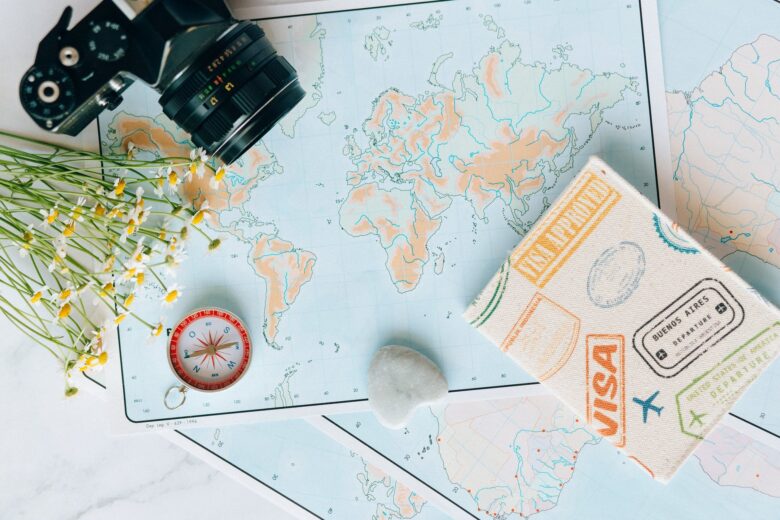Oh, to travel again. Most people had their wings clipped for nearly two global pandemic years. Seasoned travelers or newbies with a yen to get away are ready to get back out there.
There are still the usual questions about the best mode of transportation to take and the best route to get there. Now there are further questions about the safest way to travel and where you are and aren’t allowed to go. Perhaps the biggest question is always going to be how much the trip will cost.
The travel industry is reeling from the pandemic. That can mean better prices than ever on some fronts and staggering increases on others. You will need to do your homework to get the biggest bang for your travel buck.
Here are five travel tips to help your wallet when you’re ready to take flight or ground transportation again.
1. Start With What Is and Isn’t in Your Wallet

One thing that will help your wallet is to not descend into debt to take your trip. Bright memories of a great vacation may be dimmed by buyer’s remorse when you get home. You don’t want to pay massive amounts of interest on your getaway.
Set some money aside for travel, then pack your debit card as suggested by Chime. Most debit cards these days are part of a major network, like Visa, Mastercard, Cirrus, or Shazam. That means they can be used at retailers and ATMs just about anywhere in the world.
Even better, use a debit card that works with a mobile payment platform like Google Pay, Apple Pay, or PayPal. That way, you can leave your wallet in your hotel safe when you venture out for the day. You’ll just need your smartphone packed with the relevant apps.
Saving for a trip is part of the fun of planning one. You’ll appreciate not having to keep paying for it after you get home. Instead, start saving and planning your next adventure.
2. Shop for Deals

Give yourself time to shop for deals on airfare, car rental, accommodations, and event tickets. If you’re thinking about a package vacation, comparison shop for those as well. There are a lot of options, and they’re all hungry for business. Click here for more information.
It’s definitely tempting to book the first thing you find, but a little research can save you hundreds of dollars. One-stop shopping options like Expedia or Travelocity make the planning process easier. However, they may be more expensive than booking each item directly.
Hotels, airlines, and car rentals will often match any price advertised by an online travel company. Plus, there’s some security in working directly with specific vendors. If the unexpected happens, like an overbooked hotel, having booked directly with them usually gives you an advantage.
Investing time in shopping for the best prices before you book can pay dividends later. You can then use the extra remaining in your wallet for shopping while you’re on your trip!
3. Use Your Perks

When you begin planning a trip, start by inventorying the rewards you’ve accumulated through credit card or loyalty programs. You’ve earned them. Use them.
Perhaps you’ve earned a free night’s stay at a hotel affiliated with your credit card company. When looking for hotels at your destination, make sure you look into using that reward. A free night’s stay leaves more money in your pocket for other things.
Check your air miles earned and those you will earn if you book your flight with that airline. They can either pay off on this trip or the next one. Just try to pay off the purchase after you’ve earned the rewards and before that sum begins accruing interest.
Using your cash back, points, and miles can seem convoluted, so take the time to learn how these programs work.
Leveraging them can put some extra money in your travel wallet. That’s well worth the research you might need to do in order to cash in.
4. Explore Options You Aren’t Familiar With

Maybe you’ve always booked a room at a major hotel chain when you travel. You know what to expect, and it requires little imagination. But you may be paying a premium for bells and whistles you aren’t going to use, like room service or fitness centers.
If you’ve never used home-share companies like Airbnb or VRBO, check them out. For each candidate property, read reviews about the host, the neighborhood, accessibility, and amenities. Vacation rentals can be less expensive than hotels, and your host can be a fount of local information.
Likewise, look into using public transportation or rideshare programs instead of renting a car — especially as pandemic prices persist. Staying somewhere close to a subway, trolley, or bus stop can save you the hassle of driving in unfamiliar territory. Use money saved on today’s inflated car rental fees and insurance to dine at a tonier restaurant.
Travel is all about broadening your life experience by exploring new places. There’s no reason not to further broaden your horizons by exploring new ways to experience them. You may never book that predictable hotel or compact car again.
5. Plan Thoughtfully

There’s a bit of an art to planning a travel itinerary. Too much planning, and you may feel like you’ve been shackled. Too little, and your unscheduled fun may come at a steep price.
Begin by filling in strictly scheduled details such as flight or train departures and arrivals. Also, include timing issues like checking in two hours prior to an international flight and travel time to the airport. Driving may be more flexible, but figure rush-hour traffic and construction zones into your calculus.
Incorporate ample free and flexible time in your schedule that you can use to wander, linger, or just take a nap. The night before your departure for home, plan something quiet, early, and close to your accommodations. You’ll need plenty of time to pack for your return because you’ll inevitably leave with more than you arrived with.
Poor timing can lead to things like flight changes, an extra day of car rental, or overweight luggage. Those will all cost you money that could have been saved by better planning. Furthermore, if those costs come on the return home, your wallet may already be empty.
The whole point of traveling is to get away and enjoy yourself. That’s difficult to do if you’re constantly worrying about the money you’re spending. It’s smart to have a budget, but build in a cushion for unexpected finds. When you get back home, your wallet will be lighter. In all likelihood, so too will be your outlook on life.

